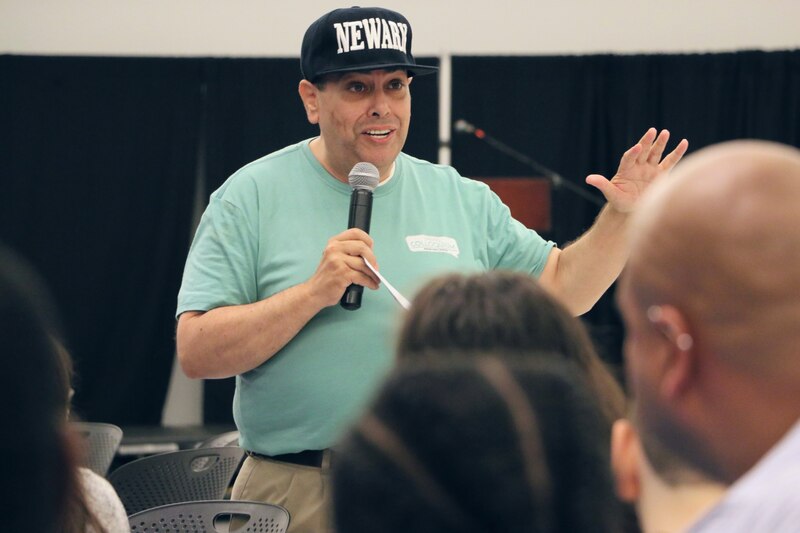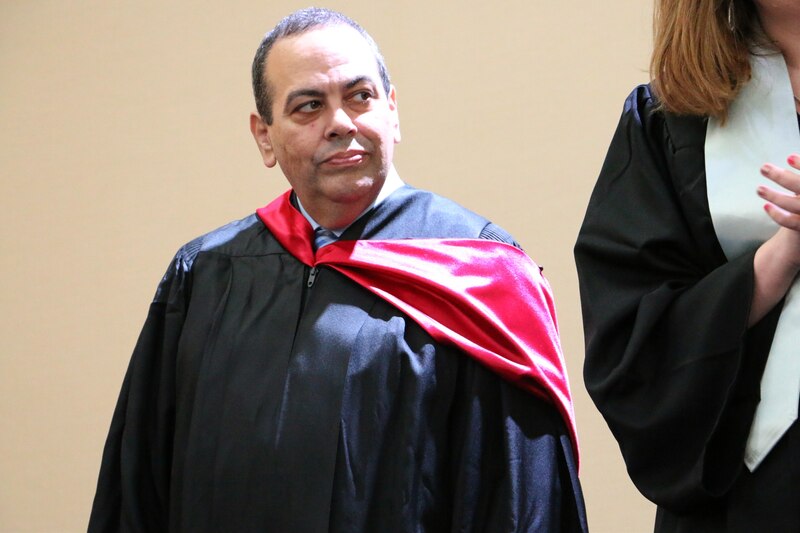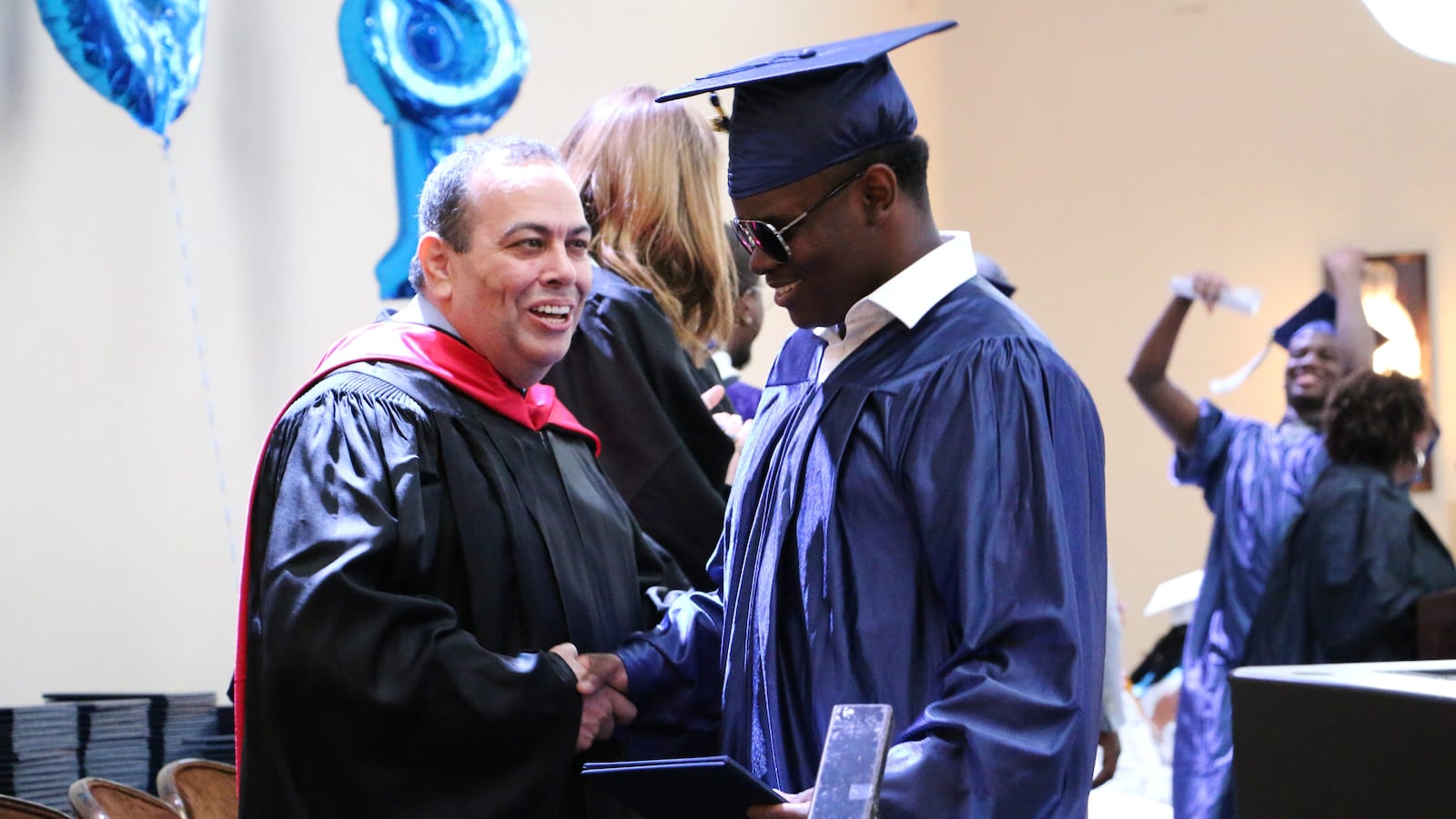At the start of the school year in 1983, a student named Roger León sat with the other ninth-graders at Science High School waiting for the principal of Newark’s premier magnet school to arrive and welcome them.
Finally, León, the child of Cuban immigrants whose mother spoke only Spanish at home, grew tired of waiting for an adult to take charge.
“Roger, God bless him, got up and started the whole meeting,” said Christine Taylor, the president of Newark’s principals union, who heard the story from a teacher who was present that day.
After that, León became a star of the school’s famed debate team, then a debate coach, a classroom teacher, a principal, a high-ranking administrator within the system’s central office, and, beginning July 1, superintendent of the Newark school system with its 36,000 students and roughly $1 billion budget. It’s the role he seems to have been preparing for his entire life.
“Roger wanted to be the superintendent when he came out of the womb,” Taylor said.
León, who is 49, is assuming the post at a historic moment. Earlier this year, the state concluded its decades-long takeover of the district, leaving behind a higher-performing school system but also a community that is exhausted — some say traumatized — by outsiders promising transformative change. It’s a transition that districts from New Orleans to Paterson are navigating as states hand back control to local school boards that are, in theory at least, attuned to their communities’ needs and accountable to voters.
In May, Newark’s elected school board chose León to become the new superintendent — the first time that board members, rather than state overseers, have made that decision in more than 20 years.
In León, the board found the ultimate insider: A lifelong Newarker who has attended and worked in the city’s public schools his entire life — even during college, when he became a substitute teacher at his former high school. Now, it falls on him to prove that a locally led district can innovate and achieve at high levels, while partnering with the community and eschewing the corruption that helped trigger the state takeover — to make Newark “a beacon of light and hope for our urban districts,” as León has promised.
But even before officially starting Monday, León already got a taste of how hard that will be.
On a Friday afternoon in June, he sent word to 31 district employees — including some top officials hired by the past superintendent — that they could resign or be fired. The move was hailed by some of León’s many supporters as a necessary housecleaning. But critics were disturbed by the swiftness and severity of the cuts, which included several lower-level administrators with ties to León’s predecessors, raising questions about whether the overhaul was about score-settling, not just reorganizing.
The shake-up also exposed the complicated dynamic between León and the school board, where some members had supported a different candidate for superintendent before agreeing to vote unanimously for León. Last week, in a display of their new authority, some members shot down a few of León’s cabinet picks and blocked him from firing several of the 31 staffers.
Now, as León shakes off that setback and steps officially into his new role as superintendent, he is expected to announce his vision and 100-day plan. Supporters of the city’s charter schools, some of whom fear a frostier relationship with León than his predecessors, will be watching closely, along with local business and philanthropic leaders who worry about the district backsliding academically or succumbing to politics. Just as vigilant will be the community activists who expect León to reject the tactics of the self-described reformers under state control who closed troubled schools and encouraged the growth of charters, and the families counting on Newark’s native son to take the district to new heights.
“There are very high expectations,” said Wilhelmina Holder, a longtime Newark activist and fan of León. “They expect him to be superman.”
From ‘underdog’ to homegrown leader
León’s life has been defined by Newark, where he was born after his parents arrived from Cuba in 1966.
“It is the only city that I know, and it is the only city that I love,” he said at a graduation ceremony in June.
He and his three older sisters were raised by their mother in the Ironbound neighborhood, which is home to many Spanish and Portuguese-speaking immigrants. He attended the elementary school around the corner from his house, Hawkins Street School, where he would later return to teach fifth grade.
At Science High School, he joined the renowned debate team. As a senior, he helped defeat the team from affluent Princeton High School to win the state championships. He saw himself not just as a competitor but also as an ambassador for his city, said Jonathan Alston, León’s former teammate who now coaches debate at the renamed Science Park High School.
“He always knew that we were the underdogs,” Alston said. “That people would hear the name Newark and think negative things.”
León coached the Science High debate team for eight years before becoming a teacher and, when he was just 28 years old, the principal of Horton Street School in Newark’s largely Hispanic North Ward. In 2001, after helping to revamp that school, he was transferred to University High School, an underperforming magnet school in the predominantly black South Ward.

At University, he added 19 Advanced Placement courses in everything from Latin to sociology to women’s studies, while extending the school’s hours and offering Saturday classes.
On the school intercom most mornings, he quoted from an inspirational poem about teaching called “The Star Polisher,” telling students that they were “stars” and faculty that their job was to make students “shine.”
“Every child’s a genius,” León told Chalkbeat in an interview earlier this year, pointing out the star-shaped lapel pin he still wears in honor of that poem. “It’s the responsibility of every adult who interacts with them to prove that to the student.”
León is beloved by many of his former students. They recall how he bought them dinner when they stayed late rehearsing a school play, or rewarded their good grades with trips to Broadway musicals.
John Brown, who graduated in 2005, said León was also a fierce advocate for his students. When the staff at a local hospital would not permit the teenager to visit his mother in the emergency room, León drove Brown back to the hospital and demanded that he be allowed in.
“He went off on everyone in the ER from the doctor to the nurses to the security guard,” Brown said. “Next thing I know, I was back there with my mother.”
But as much as León supported his students, he could also be uncompromising. He occasionally kicked out students who violated the rules, according to Noelle Jordan, who graduated in 2007.
“He didn’t take any mess,” she said.
He was similarly demanding of his staff. Former colleagues said he made it clear to teachers when they weren’t meeting his expectations. If they continued to underperform, he would get them to leave.
“He develops people; he gives them an opportunity to fail forward,” said Mario Santos, principal of East Side High School. “But if you’re not cutting it, and you’re not doing right by kids, then it’s an easy decision for him.”
A long climb to the top
León’s ascension to schools chief has been long in the making.
Since 2007, he has served as an assistant superintendent under four consecutive state-appointed superintendents and one interim chief — a testament to his deep knowledge of the district, as well as his political survival skills.
During that time, he worked closely with the community. He met regularly with parent groups and enlisted clergy members, university officials, and school leaders to help rewrite district policies, which included raising the district’s graduation requirements and making report cards easier to read.

He also developed a reputation as a taskmaster, with flashes of a hot temper, according to former colleagues. Working from his office late into the night, he issued directives and demanded compliance. One former principal said that when she insisted on sticking with the summer reading books her school always used, rather than switching to new ones ordered by the district, León threatened to write up the principal and transfer the head of her English department to another school.
“Roger could make your life very miserable if he chooses to,” the former principal said.
León told Chalkbeat that schools were required to follow the district’s summer reading list, but could add to it if they chose.
Even as León fully immersed himself in his role as assistant superintendent, he kept his sights on his dream job.
“He always used to say, ‘I’m going to be superintendent one day,’” said Kathy DiChiara, a former administrator who worked in the district’s central office at the same time as León. (She was also his calculus teacher at Science High School, where she recalled his “tremendous self-confidence.”)
In 2015, the school board, which only had advisory powers then, voted for León to become superintendent. But the state ignored its recommendation and appointed Christopher Cerf, who kept León in his administration but largely sidelined him, leaving León with tasks — such as writing proclamations to honor exceptional students — that were detached from district policy.
But his fortunes changed after Cerf stepped down in February. In the race to replace him, León beat out two applicants who have led large urban districts, as well as Newark’s interim superintendent, A. Robert Gregory.
León got some help from his longtime supporter, state Sen. Teresa Ruiz, who intervened in the selection process by pressuring the state education commissioner to replace a member of the search committee and revise the selection rules. But with the Newark school board making the choice this year, rather than officials in Trenton, he also benefited from his popularity among parent leaders, educators, and activists across the city.
“Roger’s like a rock star,” said Charles Love, a former parent organizer and school-board candidate. “He’s been in all the rooms.”
In the five weeks since his selection, León has been meeting with parents and activists, religious leaders, and labor officials — a way of shoring up support and workshopping policy ideas. On Wednesday, he assured charter school leaders that he does not plan to boot their schools from the district’s enrollment system, according to a person briefed on the meeting, despite calls to do so from critics who say the joint district-charter admissions system was designed to funnel students into charter schools.
Yet León has avoided meeting individually with the district’s top officials, who had hoped to brief him on their work but have mostly been unable to get his ear, according to two district employees. Several of those officials were among the 31 León sought to force out, which they learned through intermediaries or emails; León did not inform them himself.
In an emailed response, León said he held a meeting with the entire leadership team on May 30, received reports in June about each department’s planned work for the coming school year, and held follow-up meetings as necessary.
Meanwhile, León has been looking forward to the day when he, “a little boy from the ‘hood,” will take charge of New Jersey’s largest school district, as he told the graduates of KIPP Newark Collegiate Academy at their June commencement ceremony.
Speaking to the charter school graduates in a hotel ballroom just a few blocks from Newark Public Schools headquarters, León said he understood their nervousness as they, like him, embarked on a momentous journey. He insisted that they need not fear failure because they are up to the challenges ahead — and because, “We are in Newark, New Jersey, my people, and that is not in our vocabulary,” he said to cheers.
Instead, he suggested, what is keeping him up at night is the awesome power over children’s lives that he is about to inherit.
“We are scared,” he went on, “because of what we are about to do, and how profound its impact will be.”

